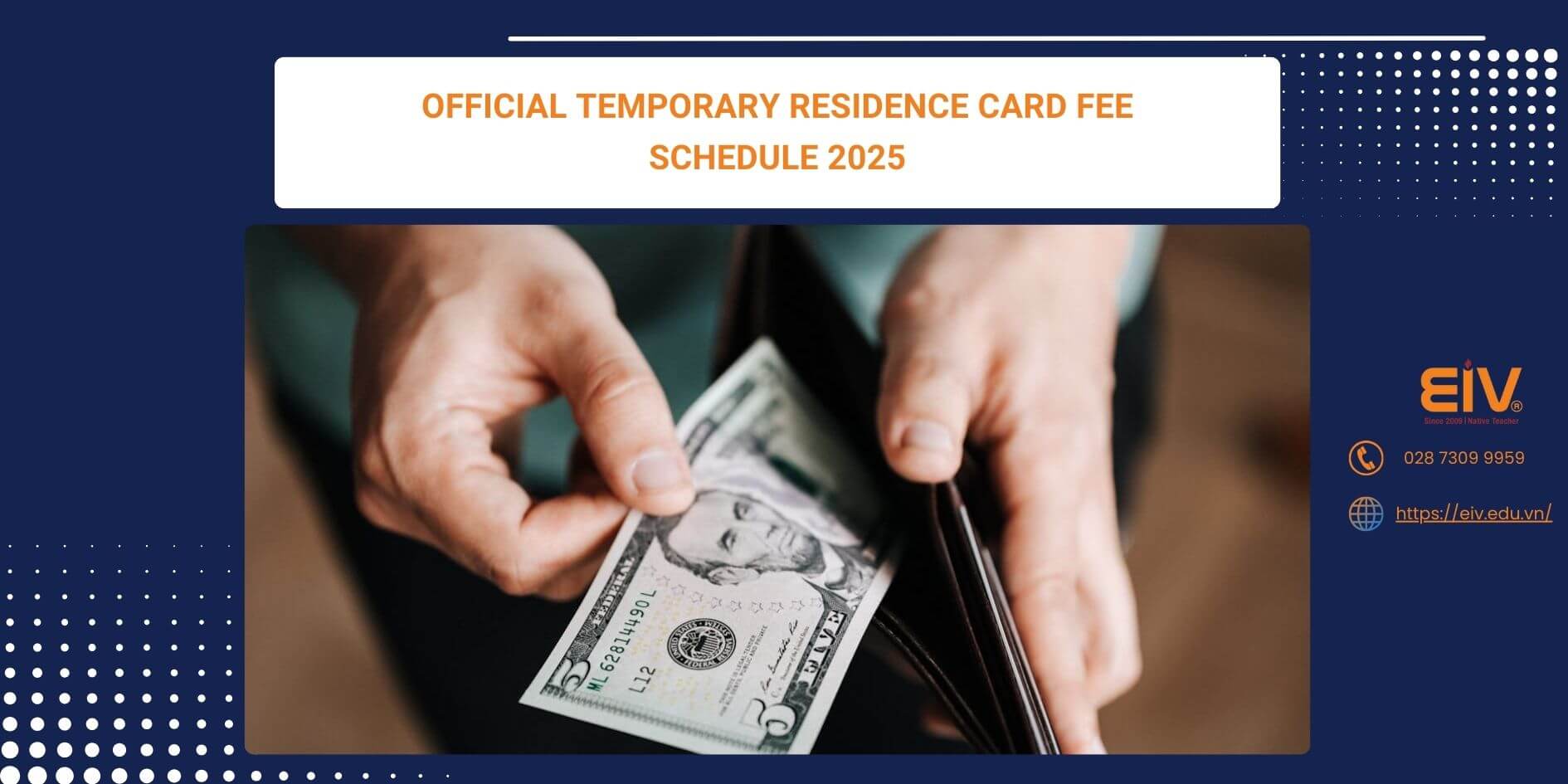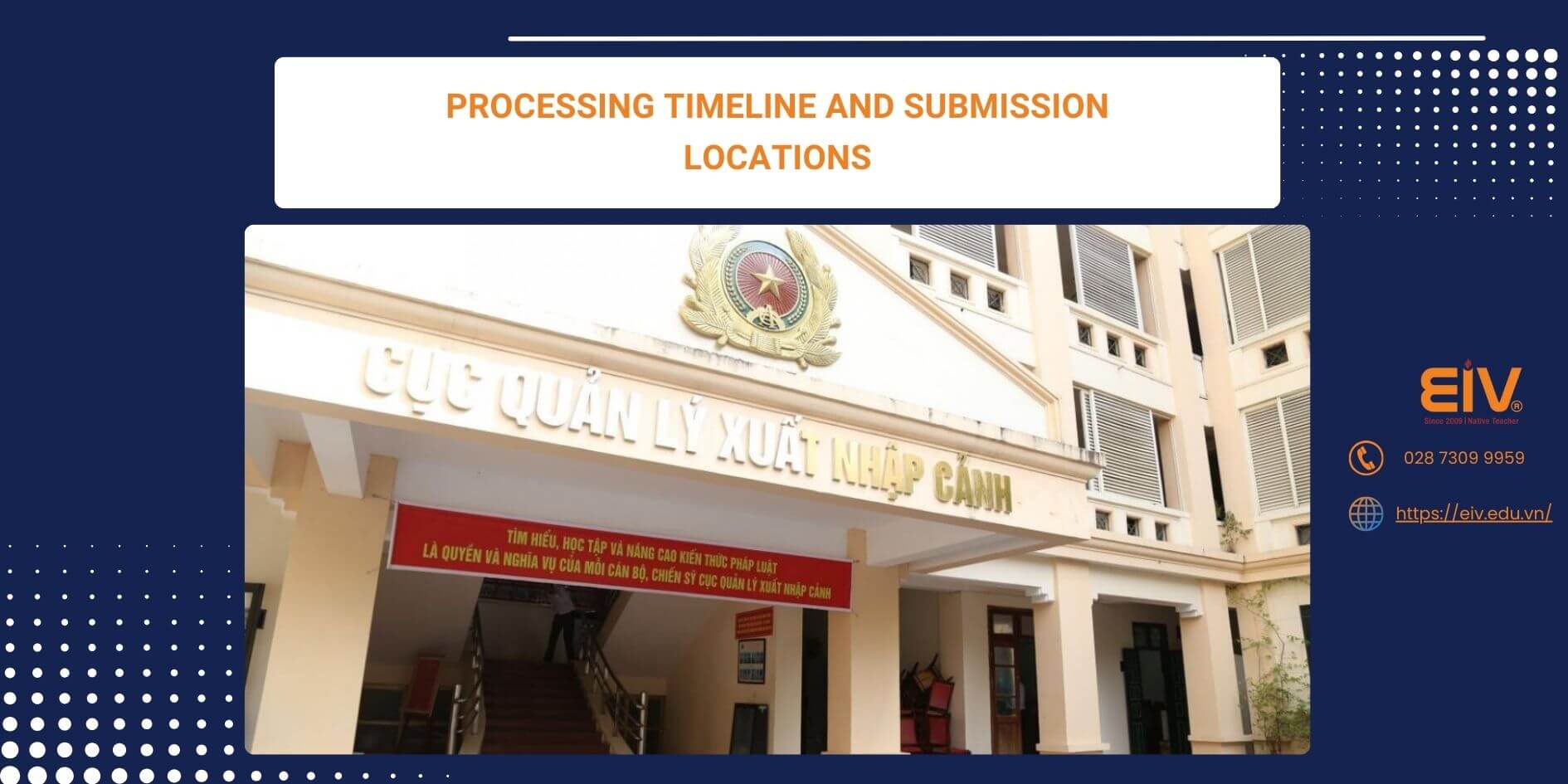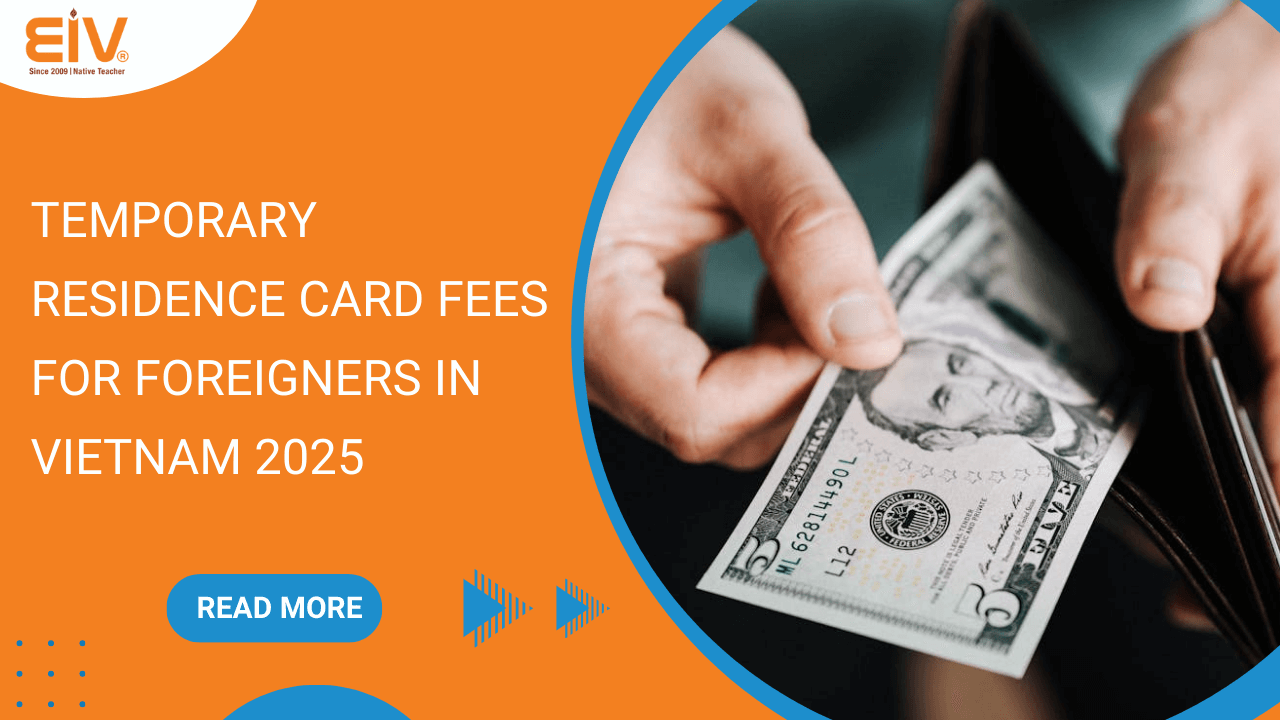Temporary residence card fees for foreigners in Vietnam range from 145-165 USD for new applications and 10 USD for renewals according to Circular 25/2021/TT-BTC. The specific cost depends on the card validity period and may be subject to Personal Income Tax depending on the circumstances.
A Temporary Residence Card (TRC) is a crucial document that allows foreigners to legally reside in Vietnam for 1-10 years without the need for periodic visa renewals. Understanding the fee structure and tax implications helps businesses and individuals plan their finances accurately while ensuring full legal compliance.
Official Temporary Residence Card Fee Schedule 2026

| Procedure Type | Card Validity | Fee (USD) | VND Equivalent* |
|---|---|---|---|
| New Application | Up to 2 years | 145 USD | ~3.6 million VND |
| New Application | Over 2 to 5 years | 155 USD | ~3.8 million VND |
| New Application | Over 5 to 10 years | 165 USD | ~4.1 million VND |
| Renewal | Any validity period | 10 USD | ~250,000 VND |
| Reissuance | According to new validity | Same as new application | Same as new application |
*Exchange rate reference: 1 USD = 25,000 VND (varies according to submission date)
Legal Framework & Payment Requirements
Fees are collected exclusively in USD or VND converted at the interbank exchange rate at the time of application submission. Credit cards, bank transfers, online payments, or other foreign currencies are not accepted.
According to Clause 1, Article 4 of Circular 25/2021/TT-BTC issued by the Ministry of Finance, fee rates apply uniformly nationwide, regardless of submission location – whether in Hanoi, Ho Chi Minh City, or other provinces. This standardization ensures fairness and transparency across all Vietnamese immigration offices.
Does Your Company Need to Pay Personal Income Tax on TRC Costs?
The answer is: it depends on the purpose and legal responsibility. Temporary residence card costs may or may not be subject to Personal Income Tax based on whether they’re considered employee benefits or business compliance expenses.
When TRC Costs Are NOT Subject to Personal Income Tax
When enterprises pay TRC costs to meet legal requirements ensuring foreign employees are eligible to work in Vietnam, these expenses are NOT included in taxable Personal Income Tax.
This principle is established in Official Letter No. 2014/TCT-DNNCN (2020) by the General Department of Taxation, referencing regulations in Clause 16a Article 8, Clause 2b Article 36, and Clause 2b Article 37 of the Law on Entry, Exit, Transit, and Residence of Foreigners in Vietnam No. 47/2014/QH13.
Required conditions for tax exemption:
- Expenses serve legal compliance for foreign labor management
- Clearly stipulated in employment contracts or company financial policies
- Costs are the employer’s responsibility, not employee personal benefits
- Company policies must specify this as a business operational requirement
When TRC Costs ARE Subject to Personal Income Tax
If companies pay TRC costs that are considered personal employee benefits outside salary and wages, these expenses must be included in taxable Personal Income Tax.
According to Official Letter No. 3867/TCT-TNCN (2017) by the General Department of Taxation: “In cases where TRC and visa costs for foreign workers are paid by companies on behalf of employees, these amounts are included in Personal Income Tax from salary and wages and must be declared according to regulations.”
For accurate tax compliance, foreign workers should verify their tax status regularly. Learn the most efficient methods in our comprehensive guide: How to Check Personal Tax Code for Foreigners in Vietnam – 5 Fastest Methods.
TRC Renewal Fees – Save 93% Compared to New Applications

Renewing a temporary residence card costs only 10 USD, providing massive savings compared to new applications (145-165 USD). This represents the most cost-effective option for maintaining legal residence status in Vietnam.
Detailed Cost Comparison: Renewal vs New Application
| Criteria | Renewal Process | New Application |
|---|---|---|
| Official Fee | 10 USD | 145-165 USD |
| Processing Time | 5 working days | 5 working days |
| Document Requirements | Simplified package | Complete initial documentation |
| Eligibility | Valid existing TRC | Expired card or first-time applicants |
| Cost Savings | 93% less expensive | Full fee required |
Step-by-Step Renewal Process
TRC renewal in Vietnam requires submitting Form NA5 and paying the 10 USD fee at least 15 days before card expiration. The process is streamlined for existing cardholders who meet renewal criteria.
- Prepare Form NA5 (Application for visa extension, residence permit renewal)
- Submit at Immigration Office – Department of Immigration or Provincial Immigration Management Office
- Pay 10 USD fee in cash (USD or VND equivalent)
- Receive results in 5 working days from complete application submission
For comprehensive renewal procedures, required documents, and potential complications, consult our detailed resource: Temporary Residence Card Renewal for Foreigners in Vietnam – Procedures, Documents & Fees 2026.
Additional Service Costs Beyond State Fees
Beyond mandatory government fees, TRC processing involves additional expenses depending on your chosen approach:
Self-Processing Cost Breakdown
- Document notarization and translation: 500,000 – 1,000,000 VND
- Photography and photocopying: 50,000 – 100,000 VND
- Transportation and time investment: Variable based on location and complexity
- Potential revision costs: Additional if documents require corrections
Professional Service Provider Costs
- Complete service packages: 15,000,000 – 30,000,000 VND
- Document preparation and consultation: 3,000,000 – 8,000,000 VND
- Representative submission services: 2,000,000 – 5,000,000 VND
Important consideration: Choose established service providers with transparent pricing. Extremely low-priced services often indicate hidden costs or inadequate support that can lead to application delays or rejections.
Fee Exemption Categories Under Article 5 Circular 25/2021/TT-BTC
Specific categories of foreigners qualify for TRC fee exemptions based on diplomatic status, humanitarian work, or international agreements:
Diplomatic and Official Exemptions
- High-level government guests – Invitees of Party, State, Government, or National Assembly leaders
- Diplomatic personnel – Officials and staff of foreign diplomatic missions, consular offices, and international organizations in Vietnam
- Humanitarian workers – Personnel conducting rescue operations or humanitarian assistance for Vietnamese organizations
International Agreement Exemptions
- Reciprocal arrangements – Citizens of countries with bilateral agreements providing mutual fee waivers
- Special circumstances – Foreigners in Vietnam who violated laws but lack financial capability and whose home countries won’t provide support
Fee Exemption Application Process
Obtaining fee exemptions requires specific documentation and follows a structured approval process:
- Document preparation – Gather official letters, diplomatic notes, or humanitarian organization certificates
- Application submission – Submit exemption request with regular TRC application materials
- Official review – Immigration authorities verify exemption eligibility and approve or deny requests
Note: Exemption eligibility is strictly limited to qualifying categories. Applicants who cannot prove exemption status must pay standard fees according to the published schedule.
Corporate Accounting and Tax Declaration for TRC Expenses
Companies sponsoring foreign employees must properly account for TRC costs to ensure tax compliance and accurate financial reporting:
Accounting Treatment for Non-Taxable TRC Costs
Debit: Account 642 - Administrative expenses
Credit: Account 111 - Cash / Account 112 - Bank deposits
Accounting Treatment for Taxable TRC Costs
Step 1: Record initial payment
Debit: Account 334 - Employee payables
Credit: Account 111 - Cash / Account 112 - Bank deposits
Step 2: Recognize as employee compensation
Debit: Account 642 - Administrative expenses
Debit: Account 3335 - Personal Income Tax payable
Credit: Account 334 - Employee payables
When processing Personal Income Tax for foreign workers, companies must carefully handle currency conversion requirements. Understanding current exchange rate rules is essential – refer to our specialized guide: Exchange Rate Rules for Foreign Workers’ Personal Income Tax in Vietnam [2026].
Essential Documentation Requirements
- Official fee receipts issued by Vietnamese immigration authorities
- Third-party service invoices with proper VAT documentation
- Employment contracts clearly specifying TRC cost responsibilities
- Board resolutions or policy documents authorizing expense categories
- Bank transaction records for all related payments
Processing Timeline and Submission Locations

Standard Processing Time
5 working days from receipt of complete and valid documentation. This timeline excludes any additional time required for document corrections or supplementation if initial submissions are incomplete.
Office hours for submission: Monday through Saturday morning (excluding national holidays and Sundays).
Primary Submission Offices
Hanoi Region:
- Department of Immigration: 44 Tran Phu Street, Dien Bien Ward, Ba Dinh District, Hanoi
- Jurisdiction: All provinces from Quang Nam northward
- Languages supported: Vietnamese, English (limited)
Ho Chi Minh City Region:
- Department of Immigration Southern Office: 333 Nguyen Trai Street, District 1, Ho Chi Minh City
- Jurisdiction: Southern provinces, Central Highlands, South Central Coast regions
- International business hours: Extended support for foreign applicants
Provincial Locations:
- Provincial Immigration Management Offices serve enterprises headquartered in their respective provinces
- Individual applicants must submit where they hold household registration or temporary residence permits
- Processing standards remain consistent with central offices
Frequently Asked Questions
Can I pay TRC fees using Vietnamese dong?
Yes, absolutely. Fees are accepted in both USD cash and VND converted at the official interbank exchange rate on your submission date. The conversion rate is posted daily at immigration offices.
Will I get my money back if my TRC application is rejected?
No, fees are non-refundable. According to Vietnamese immigration regulations, processing fees are not returned regardless of application outcomes – whether approved, rejected, or withdrawn.
Are work permit processing costs subject to Personal Income Tax?
No, work permit costs are not taxable. When companies pay work permit fees, these are considered mandatory employer responsibilities under Vietnamese labor law and are not included in employee taxable income.
Can I renew an expired temporary residence card?
No, expired cards cannot be renewed. You must submit a completely new application with full fees (145-165 USD) and complete documentation requirements. Plan renewals at least 30 days before expiration.
Is online TRC application submission available?
Partially available online. You can submit initial applications through the National Public Service Portal or Ministry of Public Security portal, but original documents must still be mailed to immigration offices for final processing.
What happens if my TRC is lost or damaged?
Reissuance is required with fees equivalent to new applications plus additional administrative processing. You must file a police report for lost cards and provide detailed explanations for damaged cards.
Do different TRC types (work, investment, family) have different fees?
No, fees are uniform by validity period only. Whether your card is for employment (LD1, LD2), investment (DT1, DT2, DT3), family reunion (TT), or other purposes, fees depend solely on the requested validity duration.
Can my company pay TRC fees by corporate credit card or wire transfer?
No, only cash payments accepted. Immigration offices require USD bills or VND cash at the time of document submission. Electronic payment methods are not currently supported by Vietnamese immigration systems.
How long before expiration should I start the renewal process?
Start at least 30 days before expiration. While the law requires renewal applications within 15 days of expiration, earlier submission provides buffer time for document corrections or unexpected delays.
Can I work in Vietnam while my TRC renewal is being processed?
Yes, if your current TRC remains valid. You can continue working under your existing card until the renewal decision is made. However, if your card expires during processing, you must stop working until renewal is approved.
Understanding TRC fees for foreigners in Vietnam requires attention to both immigration regulations and tax implications. With new application fees of 145-165 USD and renewal costs of only 10 USD, strategic planning can result in significant cost savings over time.
Key recommendations for foreign workers and their employers:
- Establish clear policies regarding TRC cost responsibilities in employment contracts
- Consult qualified tax advisors for proper Personal Income Tax treatment
- Plan renewal timing to avoid expensive new applications due to expiration
- Maintain comprehensive documentation for both immigration and tax compliance purposes
- Consider professional services for complex cases or when time constraints exist
The Personal Income Tax implications of TRC costs represent a critical compliance area that requires careful handling. Companies should work closely with qualified accountants and tax professionals to ensure proper treatment based on their specific circumstances and employment arrangements.
By following these guidelines and staying current with regulatory changes, foreign workers can maintain legal residence status in Vietnam while optimizing costs and ensuring full compliance with both immigration and taxation requirements.
This comprehensive guide is compiled from official sources including Circular 25/2021/TT-BTC (Ministry of Finance), Law 47/2014/QH13 on Entry, Exit, Transit, and Residence of Foreigners in Vietnam, and guidance from the General Department of Taxation. Regulations may change; verify current requirements with competent Vietnamese authorities before making important decisions.





 Hồ Chí Minh: 028 7309 9959 (Phím 1)
Hồ Chí Minh: 028 7309 9959 (Phím 1)
